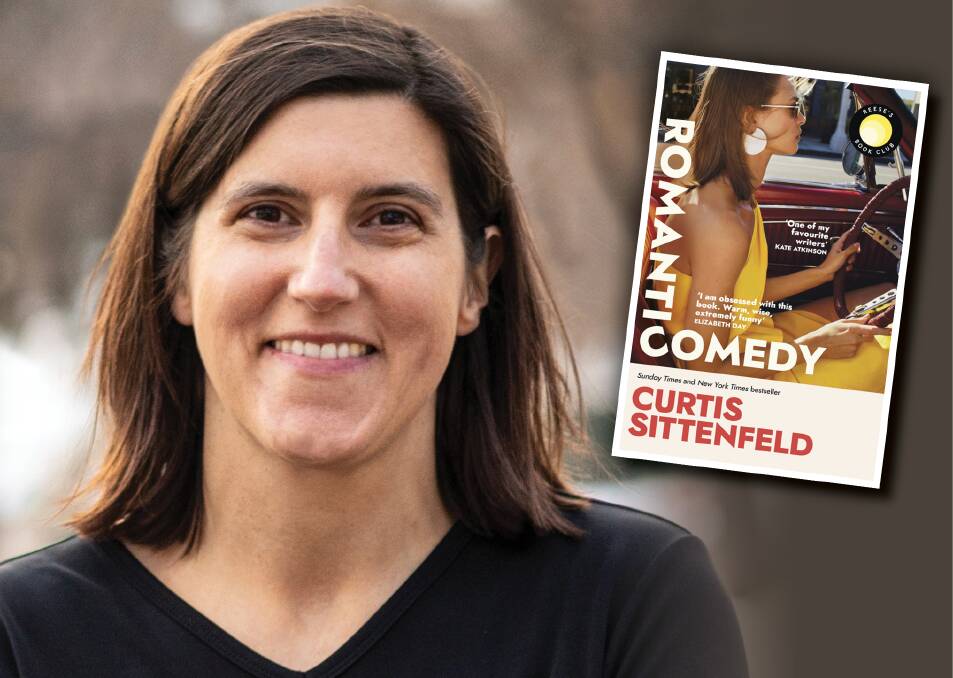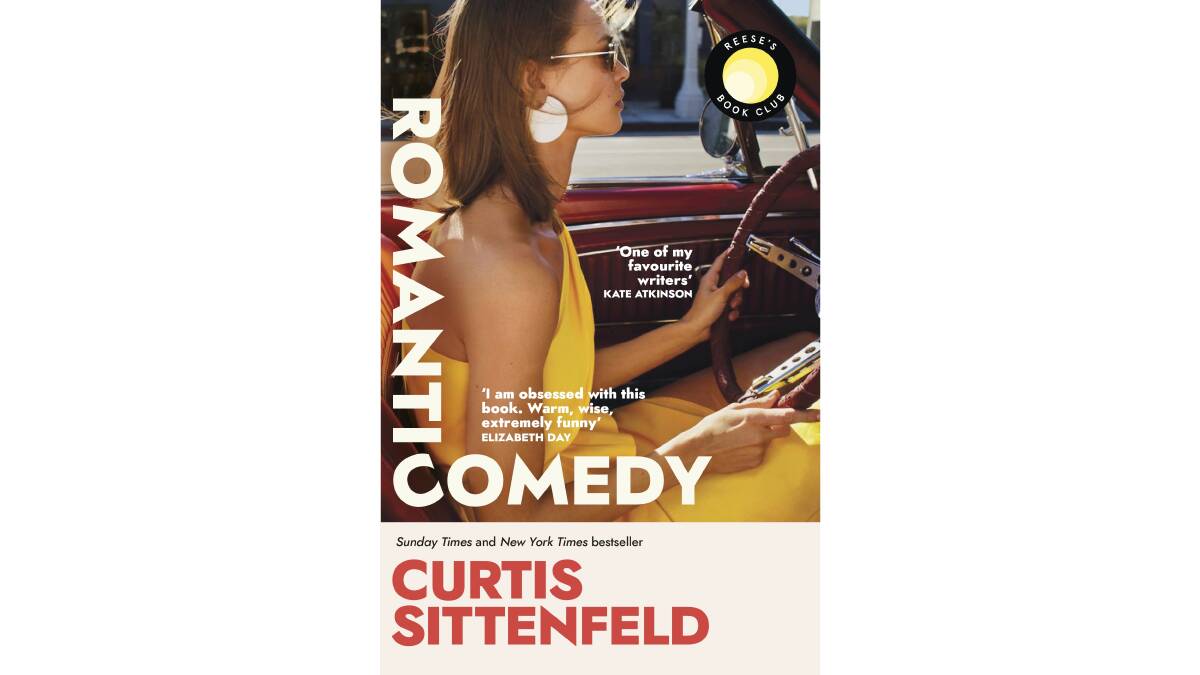
- Romantic Comedy, by Curtis Sittenfeld. Doubleday, $32.99
Curtis Sittenfeld and I are talking about happy endings. Her new novel has one, and she is openly shocked to hear that I was relieved, so relieved, that this is the case.
Subscribe now for unlimited access.
or signup to continue reading
"Really? You really thought it wasn't going to have a happy ending?" she says, her confusion palpable, even via a Zoom call from Minneapolis, Minnesota, where she lives with her family.
Well, yes, I say. It's what I've grown accustomed to in this post-COVID world of cynical pessimism. I suppose I'm just used to stories aligning more with real life - flawed characters, complicated social mores, lingering secrets, and realist conclusions.
She's still shocked. But then, I tell her, the last time we spoke, it was 2020, and we were deep into the pandemic lockdown. We were on opposite sides of the planet, experiencing the same chaos and uncertainty. And the book we were talking about back then was Rodham, her reimagining of a world in which Hilary Clinton had not married Bill.
It was, to put it mildly, the kind of book to really make you think. I mean, Donald Trump was still president, and here she was, imagining an entirely different reality.

Across several novels and short stories, she's also written about boarding school (her 205 hit Prep), the life of former First Lady Laura Bush (2008's American Wife), suburban relationships (2006's The Man of My Dreams, plus numerous short stories), people who can see the future (2013's Sisterland).
Then again, she has also published Eligible, a modern-day interpretation of Jane Austen's Pride and Prejudice, so I shouldn't be surprised at her shifting moods on the page.
It's just that Romantic Comedy, her latest novel, is exactly what it says in the title - a funny romantic romp. Set behind the scenes of the long-running sketch show Saturday Night Live, it's based on the premise that in real life, funny-but-ordinary-looking guys often end up dating - even marrying - wildly beautiful and famous female celebrities, but the same is rarely true of funny-but-ordinary-looking women.
So what if one such woman, in this case sketch writer Sally Milz, falls for the super-hot, super-famous singer Noah Brewster? How complicated would it be? Or how simple?
It's a great premise, not least because of the prodigious amount of research Sittenfeld did when bringing the story to the page. It's also hilarious - the premise begins as a prospective late-night sketch, and is based on, not to mention named after, one of Sally's own colleagues. Danny Horst, a funny schlub, is engaged to a stunning actress, and what is with that?
But wait, is this week's musical guest flirting with her? Should she let it happen, or swiftly sabotage it in her usual, world-weary, cynical fashion?
The show is based largely on fact, although in this story, Saturday Night Live is renamed "The Night Owls", and the overlord is not Lorne Michals, but Nigel Petersen. He, like Michaels, watches the live show each Saturday from a special booth, sipping rosé. In the book, like in life, bringing the show to fruition each week is a marathon effort of astonishing energy and dedication, especially for something so ostensibly silly.
The level of detail has been gleaned from a lifetime of watching the show - Saturday Night Live came into being in 1975, the same year Sittenfeld was born - reading the discourse around it, watching casts and writers come and go, and wolfing down the often salacious memoirs of some of its more famous cast members, like Tina Fey, Molly Shannon, Rachel Dratch and, it must be said, Colin Jost, the living embodiment of the book's subject matter, a comedian married to a superstar (Scarlett Johansson, in this case).
It's the research that makes the book so real, even with such a clearly confected, feel-good premise, right down to the writers' room meetings (and the rosé).
"It's funny, because I go through life often finding myself and other people absurd and finding situations absurd," Sittenfeld says.
"And I often will think, oh, that seems like an SNL sketch. And so I just started jotting down whenever that thought occurred, for a few months.
"But I do think doing research really makes fiction richer, because if you don't do research, you don't even know what you don't know. And then also - this feels kind of ironic, or strange - but including super-realistic details I think just makes the fiction more immersive and makes it come more alive.
"There are some things that I knowingly changed. But...if there's a journalist or a novelist on a TV show, or in a movie, and it's super-unrealistic, it's really off-putting to me, and it just makes me doubt the intelligence of the whole project. And so I want to do the opposite. I want to get the details so right that the reader can then concentrate on the emotions and the characters and the plot. It's almost like I'm trying to earn the reader's confidence."
Ultimately, though, when she set out to create a comedy based on a bone fide institution of the American comedy landscape, she really just wanted to cheer herself - and everyone around her - up. Even with the pandemic as a central plot point, or maybe because of it, the story is as feel-good as it's possible to be.
"If you write realistic fiction, and it takes place during or after 2020, it can be in a parallel universe, or you can address it [the pandemic] head on," she says.
"I didn't want it to take over the plot. But obviously, the pandemic has been terrible. Terrible in big ways, terrible in small ways. I think that it felt a little bit like an act of optimism to let my characters kind of find each other or come together during the pandemic, or in spite of the pandemic. And so it sort of felt like having something good come out of something bad.
"It's not a coincidence that I wrote a light, fizzy, romantic novel. And in terms of doing research, the research I was doing was watching Saturday Night Live, reading memoirs by cast members, listening to comedians interview each other. I really was trying to find lightness and humour and happiness. I didn't want to write a sad or dark book - some of my books have been lighter, and some have been darker. But it was a very conscious decision on my part that I wanted to cheer myself up and then cheer people up too."
I tell her how escapist it felt, rooting for a high-stakes but ultimately straightforward romance between two people, and watching it duly unfold. It's the kind of thing that is unlikely to happen to most people, especially not 40-something women with children and long-term partners, like me. And like Sittenfeld herself.
"I mean, I'm in my 40s, I have kids, and it's actually my 15th wedding anniversary today," she says, laughing. "The funny thing is my family had a super early dinner because one of my kids has an after-dinner activity, and my husband took her, and then he goes to a bar and reads. So that's the romance of 15 years of marriage. Obviously, different stages of life have different seasons. Is that a diplomatic way to put it?"
Coming from someone who prompted me to smile and turn the pages voraciously for as long as it took me to reach the highly satisfying conclusion, I'll take it.


